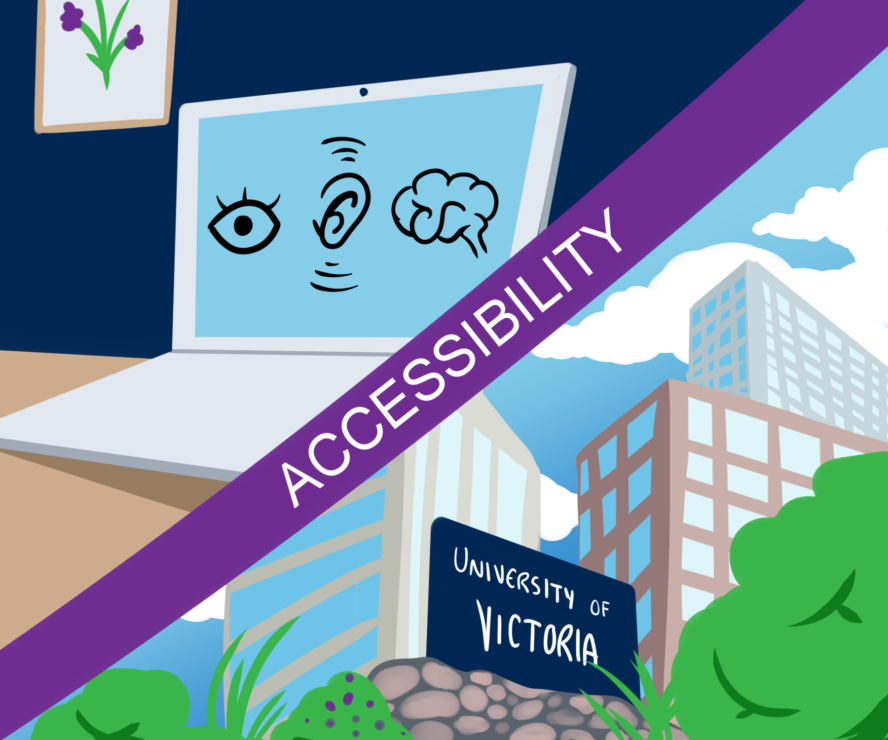UVic says they continue to implement changes to accommodate students with disabilities

As the fall semester witnessed the return of face-to-face instruction on UVic’s campus, the #Access4All initiative states, “international and disabled students are being left behind.”
The campaign is led by UVic’s Society for Students with a Disability. They’ve been calling on UVic to implement accommodations for disabled students and international students since spring 2021.
“It’s hard to overstate the negative impact of removing the improvements in equitable access
to education made since online education was implemented,” said Julia Denley, the Co-Chair of the Access4All campaign. “And as we revert to a pre-pandemic way of doing things, we need to be honest that students with disabilities are being systematically excluded from UVic.”
The #Access4All campaign is drafting a letter to outline the accommodations that will best support the groups they are advocating for. UVic states that while classes will be primarily in person, they are in the midst of implementing changes and consulting with working groups to further the accommodations available to disabled students.
Behind the #Access4All campaign
The #Access4All campaign advocates on behalf of students with disabilities, international students, immunocompromised students, and other students that have been negatively impacted by the housing crisis. Essentially, they advocate for any group that has been negatively impacted by UVic’s return to in-person classes.
#Access4All is calling on the university to adopt a HyFlex model that allows students to attend classes either online or in person. This model entails the format in which students accessed courses would be chosen on a daily basis, at their discretion. As well, they want UVic to commit to continue anti-ableism work on campus for more equitable access to higher education.
Many of the students involved in the campaign have lived experience as students with disabilities that informs their perspectives. Sophie Papp, media coordinator for the #Access4All campaign, struggles with fatigue, balance issues, and difficulty concentrating in distracting classrooms.
“[In lecture halls,] you kind of have to walk out on this little precipice, and that’s down in the middle,” said Papp. “That didn’t feel super safe to me at times, especially when maybe I didn’t sleep as well or my balance was particularly bad that day.”
Julia Denley, #Access4All co-chair, has a genetic connective tissue disorder which affects her mobility to the point that her joints can easily become dislocated.
“I’d often be in so much pain by the time I get somewhere,” said Denley about getting to in-person class. “Then for most of the class, I’d be sitting there trying to, like not scream out in pain kind of thing, which you can imagine if you’re in that kind of headspace or feeling that way, you’re probably not learning the best you can at the same time.”
Denley states that previously, she had learned to cope with this. But when classes were forced online by the COVID-19 pandemic, she realized that the majority of energy she had was being diverted towards showing up and managing symptoms in class, or catching up when she was too sick to attend, and little was left over for actual learning.
“At this point, I have Cerebrospinal Fluid Leaks (CSF). I’m pretty much bedridden. And so I wouldn’t be able to attend in-person classes at all. And I’m immunocompromised, my doctor doesn’t want me on campus around any potential COVID risk.”
UVic’s attempts to accommodate
The online structure that was necessary during the pandemic has opened up a debate around the possibilities that technology plays in equalizing the academic field. At UVic, this means the university is taking a closer look at different methods of course delivery.
“While UVic will continue to be a predominantly in-person institution post-pandemic, we have seen that online courses are well suited to some learning objectives and appealing to some students,” Karen Johnston, UVic’s associate director of public affairs, said. “We know that some students appreciate the flexibility of being able to integrate such courses into their schedules.”
Johnston says UVic is constantly updating their approach to accommodate students. They are reviewing the academic accommodation and access for students with disabilities policy and have created a working group to consult with members of the UVic community about post-pandemic course delivery modes. UVic has also brought on three learning experience designers to assist instructors.
“With the support of these designers, instructors are encouraged to adopt principles of Universal Design for Learning (UDL) to create more flexibility in their courses in order to support the needs of UVic’s increasingly diverse complement of students,” Johnston said.
UDL encourages professors to explore different modes of instruction that, in turn, can provide students with more diverse opportunities to display their competency of course material. The research-based framework guides UVic’s new learning experience designers.
While the university has released their back to school plan stating students have access to concessions in the case of illness, providing online recordings of lectures has been left to the discretion of professors. UVic has updated 90 per cent of bookable classrooms to include audio visual technology.
“UVic supports equitable access to education, and we regularly review our policies and services to ensure students of all abilities and backgrounds are well supported to achieve academic and personal success,” said Johnston.
#Access4All campaign continues
Papp explains that while UVic has been responsive to their concerns, they have also experienced push back on their agenda. Papp says their campaign has found it hard to get their message across to UVic given the absence of a sole person, committee, or body that is responsible for addressing concerns of this nature at UVic.
Papp says that, going forward, the campaign will be writing a letter to UVic signed by various campus partners.
“There are some policy barriers,” Papp said. “The nice part is that […] we can hopefully change it. The not-so-nice part is that it takes a long time and students are falling behind.”







